| Listing 1 - 10 of 50 | << page >> |
Sort by
|
Book

ISBN: 2905518596 2905518367 Year: 2017 Publisher: Cergy-Pontoise : CIRAC,
Abstract | Keywords | Export | Availability | Bookmark
 Loading...
Loading...Choose an application
- Reference Manager
- EndNote
- RefWorks (Direct export to RefWorks)
La télévision est en sursis. Bientôt, elle ne sera plus le seul média de référence : inexorablement, Internet poursuit sa montée en puissance, et le portable se métamorphose en téléviseur. La numérisation a brouillé les frontières entre les divers moyens de communication électroniques : audiovisuel et télécommunications convergent vers un nouvel ensemble aux contours indéfinis. Comment l'Europe réagit-elle à ces mutations ? Comment en particulier la France et l'Allemagne abordent-elles ces défis ? Malgré d'importantes différences dans l'organisation concrète des marchés et de leur régulation, nos deux pays partagent foncièrement la même approche de la mission de l'audiovisuel, fondée sur la nécessité de garantir le pluralisme des opinions. Mais pourra-t-il encore assurer cette mission, indispensable au lien social, à l'ère du numérique ? Le consommateur des médias, le citoyen, est aujourd'hui largement libre de ses choix ; faut-il, et si oui, comment, le protéger contre les nouveaux risques susceptibles de naître dans un avenir médiatique encore incertain ? Face à la convergence de fonctions naguère séparées entre éditeurs, diffuseurs, fournisseurs d'accès, quelle approche faut-il développer pour veiller au libre jeu de la concurrence, au libre accès de tous au marché et à la libre circulation de l'information ? Convient-il de soumettre à l'avenir les médias aux seules lois du marché ? Ou convient-il au contraire de développer un statut d'exception rénové ? Faut-il, à l'ère du numérique, réguler plus, moins, ou autrement ? Et, le cas échéant, où devrait se situer cette régulation : à l'échelon des Etats membres, à celui de l'Europe ? Toutes ces interrogations nous renvoient à la question du sens que nous voulons donner au modèle de société qui naîtra des changements que traversent la France, l 'Allemagne et l'Union européenne en ce début de l'ère du savoir et de la connaissance. Elles sont au cœur d'un dialogue entre journalistes spécialisés, experts,…
Library, Information & Communication sciences --- Sociology & Anthropology --- numérique --- médias --- régulation --- économie du savoir --- société de la connaissance
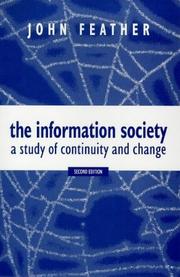
ISBN: 1856042693 Year: 1998 Publisher: London Library Association
Abstract | Keywords | Export | Availability | Bookmark
 Loading...
Loading...Choose an application
- Reference Manager
- EndNote
- RefWorks (Direct export to RefWorks)
Mass communications --- Informatiemaatschappij --- Information society --- Informationsgesellschaft --- Sociedade da informação --- Société de l'information --- Société de la connaissance --- Société du savoir --- Information society. --- Information technology --- Social aspects --- Communication
Book
ISBN: 9780470672099 0470672099 9781118328125 9781118328132 9781118328149 9781118328156 9781118328163 Year: 2014 Volume: 14 Publisher: Chichester Wiley-Blackwell
Abstract | Keywords | Export | Availability | Bookmark
 Loading...
Loading...Choose an application
- Reference Manager
- EndNote
- RefWorks (Direct export to RefWorks)
When Blackwell published the first edition of Contemporary Debates in Epistemology in 2005, that volume very quickly became epistemology's superego: it expressed the ideals that were implicit in the best recent epistemological work, and it served to guide both practicing and apprenticing epistemologists to the questions that mattered most to the field back then. Of course, the questions that matter most in 2013 are not exactly the same as those that mattered most in 2005; thus, the need for a new edition. I expect that this new edition — which contains units on the now widely discussed issues of whether knowledge is epistemologically fundamental, whether practical concerns encroach on epistemic status, whether evidential justification is permissive, what sort of epistemic luck (if any) is incompatible with knowledge — will serve to guide epistemological practice for the next several years, and with at least as much authority as the first edition. The contributors are among the most prominent in the field, and their contributions represent some of the best work being done on the topics under discussion. If you want to contribute to the most important epistemological conversations today, you will need to read this book.
Theory of knowledge --- Knowledge, Theory of --- Acquisition de connaissances. --- Knowledge society. --- Knowledge, Theory of. --- Learning. --- Philosophie. --- Philosophy. --- Société de la connaissance.
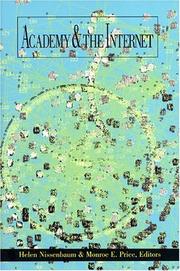
ISBN: 0820462039 Year: 2004 Volume: 12 Publisher: New York, N.Y. Lang
Abstract | Keywords | Export | Availability | Bookmark
 Loading...
Loading...Choose an application
- Reference Manager
- EndNote
- RefWorks (Direct export to RefWorks)
Science --- Computer architecture. Operating systems --- Methods in social research (general) --- Informatiemaatschappij --- Information society --- Informationsgesellschaft --- Sociedade da informação --- Société de l'information --- Société de la connaissance --- Société du savoir --- Internet --- Social aspects
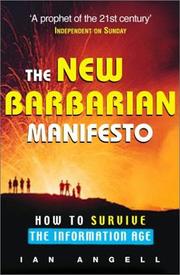
ISBN: 0749431512 9780749431518 Year: 2000 Publisher: London Kogan Page
Abstract | Keywords | Export | Availability | Bookmark
 Loading...
Loading...Choose an application
- Reference Manager
- EndNote
- RefWorks (Direct export to RefWorks)
Sociology of culture --- Informatiemaatschappij --- Information society --- Informationsgesellschaft --- Sociedade da informação --- Société de l'information --- Société de la connaissance --- Société du savoir --- #A0005A --- 691 Informatiemaatschappij --- Information technology --- Social aspects --- 316 --- 316 Sociologie --(algemeen) --- Sociologie --(algemeen)
Book
ISBN: 9789512272839 9512272830 Year: 2004 Publisher: Jyväskylä Gummerus Kirjapaino Oy
Abstract | Keywords | Export | Availability | Bookmark
 Loading...
Loading...Choose an application
- Reference Manager
- EndNote
- RefWorks (Direct export to RefWorks)
"Assigned by the Ministry of Education to compile an eLearning report, Member of the Finnish parliament, Markku Markkula, proposes the following actions: strengthening citizenship in the information society, developing value chains, accelerating market development, encouraging versatile collaboration, developing crucial human resources in e-learning, enhancing world-class performance in selected areas, such as game and simulator industry, and optimising the use of existing financial resources."--Publisher.
Book
ISBN: 3631317026 Year: 1997 Publisher: Frankfurt am Main Lang
Abstract | Keywords | Export | Availability | Bookmark
 Loading...
Loading...Choose an application
- Reference Manager
- EndNote
- RefWorks (Direct export to RefWorks)
Social change --- Information systems --- History --- I/T --- ICT --- IT --- Informatiemaatschappij --- Informatietechnologie --- Information [Technologie de l'] --- Information society --- Information technology --- Informationsgesellschaft --- Sociedade da informação --- Société de l'information --- Société de la connaissance --- Société du savoir --- Technologie de l'information --- informatie- en communicatietechnologie --- Social aspects
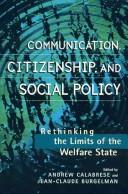
ISBN: 084769108X Year: 1999 Volume: *2 Publisher: Lanham, Md Rowman & Littlefield
Abstract | Keywords | Export | Availability | Bookmark
 Loading...
Loading...Choose an application
- Reference Manager
- EndNote
- RefWorks (Direct export to RefWorks)
Sociology of policy --- Social policy --- Mass communications --- Burgerrecht --- Citizenship --- Citoyenneté --- Etat providence --- Informatiemaatschappij --- Information society --- Informationsgesellschaft --- Nationaliteit (Burgerrecht) --- Nationality (Citizenship) --- Nationalité (Citoyenneté) --- Sociedade da informação --- Société de l'information --- Société de la connaissance --- Société du savoir --- Staat [Welvaarts] --- State [Welfare ] --- Telecommunicatie--Regeringsbeleid --- Telecommunicatiebeleid --- Telecommunication and state --- Telecommunication policy --- Télécommunications--Politique gouvernementale --- Welfare state --- Welvaartsstaat --- Citizenship. --- Information society. --- Telecommunication policy. --- Welfare state.
Book
ISBN: 1566079500 Year: 1995 Publisher: Charleston Computer Technology Research Corp.
Abstract | Keywords | Export | Availability | Bookmark
 Loading...
Loading...Choose an application
- Reference Manager
- EndNote
- RefWorks (Direct export to RefWorks)
Eenentwintigste eeuw --- I/T --- ICT --- IT --- Informatiemaatschappij --- Informatietechnologie --- Information [Technologie de l'] --- Information society --- Information technology --- Informationsgesellschaft --- Sociedade da informação --- Société de l'information --- Société de la connaissance --- Société du savoir --- Technologie de l'information --- Twenty-first century --- Vingt et unième siècle --- informatie- en communicatietechnologie --- Information networks --- Société informatisée --- Réseaux d'information --- Société informatisée --- Réseaux d'information
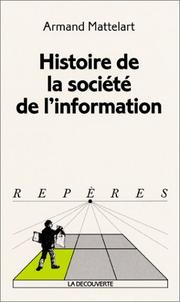
ISBN: 2707134155 9782707134158 Year: 2001 Volume: 312 Publisher: Paris : La Découverte,
Abstract | Keywords | Export | Availability | Bookmark
 Loading...
Loading...Choose an application
- Reference Manager
- EndNote
- RefWorks (Direct export to RefWorks)
Informatiemaatschappij --- Information society --- Informationsgesellschaft --- Sociedade da informação --- Société de l'information --- Société de la connaissance --- Société du savoir --- Communication --- History --- Social aspects --- Histoire --- Aspect social --- Societe informatisee --- Sciences de l'information --- Societe informatisee - Histoire --- Communication - Histoire --- Communication - Aspect social --- Information, societe de l'
| Listing 1 - 10 of 50 | << page >> |
Sort by
|

 Search
Search Feedback
Feedback About UniCat
About UniCat  Help
Help News
News